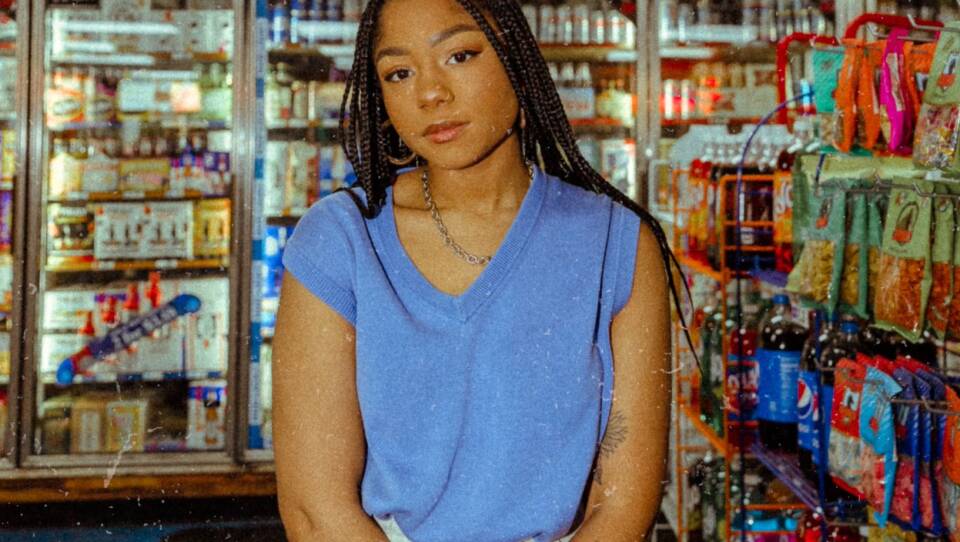Amber Ais has been independently producing her own music since 2017 and has long dreamed of making music for a living.
The 25-year-old Stoughton native gained some recognition over the years through performing at local venues like Bow Market and having her song “ Anything ” featured on three Spotify playlists. But she recently gained a new level of exposure after she posted a 7-second video to TikTok about her experience feeling discredited as a Black woman who makes pop music.
“I was just remembering that my friend came up to me and he was like, ‘I showed people your music the other day and they all thought you were white.’ And I was like, ‘that's really weird,’” she recalled.
In the two weeks since she posted that video, it has garnered nearly a million views and more than a thousand comments.
Ais said she has always felt uncomfortable with the way that people perceive Black women in the music industry — placing them in “boxes” to produce music in the R&B, rap or neo-soul genres.
“Those genres are beautiful and great in their own right, but they have never really felt genuine to me,” she said. “What felt genuine to me, always, was writing on my guitar and singing my feelings all the time.”
Ais' frustration with the industry is not an isolated incident. Pop icon Whitney Houston faced criticism for her music and not being "Black enough" to get airtime on some Black-owned radio stations. Today, artists like Lizzo and Normani have faced their own struggles while breaking into the pop genre.
And in 2020, the racial reckoning prompted major record labels to look at how Black musicians failed to benefit from the pop music category because their work was often labeled "urban."
Emmett G. Price III, dean of Africana studies at Berklee, where Ais majored in songwriting, said there's an historic precedent to the industry's narrow idea of the type of music a Black woman should make.
"Going all the way back to Sis. Rosetta Tharpe, Big Mama Thornton and Odetta, Black women have be sidelined, ostracized and silenced by an industry that took the privilege to label them, and extract their cultural brilliance and musical artistry," he said. "The conflation of racial injustice and gender injustice is a reality both then, and unfortunately, now.”
Ais added that white musicians attempting to break into different genres have the advantage of not encountering the same antagonism as Black artists.
“White people can do whatever they want in the music industry,” she said. “We have white rappers, we have white R&B artists, we have people like Ariana Grande and Justin Bieber who clearly have Black influences in their music, and we all eat it up.”
The freedom that Ais sees granted to white musicians could also be a symptom of the lack of diversity among leadership in the industry. A 2021 report out of The Annenberg Inclusion Initiative looked at 119 companies, six industry categories and 4,060 industry executives. Among the executives, a mere 19.8% were from underrepresented racial and ethnic groups.
"Underrepresented and Black artists are dominating the charts, but the C-suite is a ‘diversity desert,’” lead researcher Stacy L. Smith said in a statement.
"White people can do whatever they want in the music industry. We have white rappers, we have white R&B artists, we have people like Ariana Grande and Justin Bieber who clearly have Black influences in their music and we all eat it up."- AMBER AIS, SINGER/SONGWRITER
Ais is forging her own path in the industry. She has grown from around 300 TikTok followers earlier this month to over 10,000. In addition to the video's nearly one million views, hundreds of TikTok users have set her song “Ordinary” as the soundtrack to their own original videos.
“Nothing like this has ever happened to me with my music ever,” Ais said. “There are some people who [used the song for] videos of them in the snow … some people have videos of them with their significant other — and that's really cool to see.”
She credits her sudden rise to her faith in God, a theme that she also strives to incorporate in her music.
“As a Christian, I believe God made me the way I [am]. He made me a writer and he made me a singer,” she said. “And so if I don't use these gifts, I feel like I would be doing him a disservice.”
Ais, who moved to Nashville last year and works as a nanny during the day, said she was inspired to write the upbeat pop song "Ordinary," which will be released on Spotify on Friday, based on the relationship between the main characters in the Netflix film franchise “To All the Boys I’ve Loved Before.”
"I was watching the movie, and at the end, Peter Kavinsky, the main character guy, he says [to the main female character], 'I know you hate driving in the snow,'" she recalled. "So I wrote down on my phone, 'I hate the snow, but with you, it's confetti.' And I was like, 'oh, that sounds like a song I could write!'"






